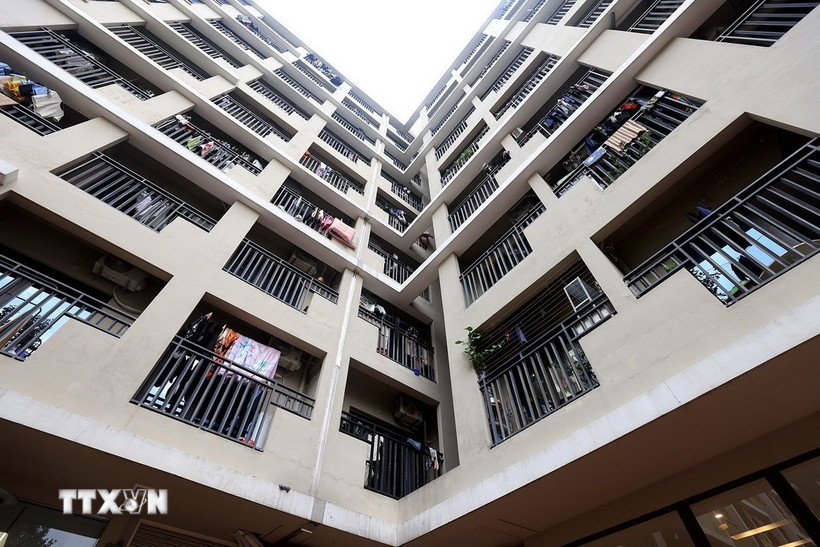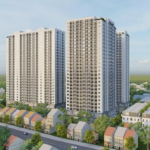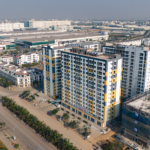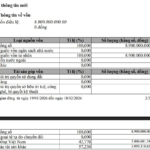
Social housing is an essential need for low-income earners and workers in industrial zones. (Photo: Tuan Anh/VNA)
|
Over four decades of renewal, Vietnam has drastically transformed its housing policy system from a centralized and subsidized mechanism to a dynamic market economy.
During this transition, alongside a vibrant real estate market, the State has steadfastly played its role in vigorously implementing social housing policies to create supply and ensure that people, especially low-income groups, can access stable housing at reasonable prices.
Renewal and the Emergence of the Real Estate Market
Since 1986, especially from the 1990s onwards, Vietnam gradually opened up its economy, encouraging private and enterprise investment in the real estate sector. Housing shifted from being “granted” to being “bought and sold,” fluctuating with supply and demand and market-influenced pricing. Commercial apartment projects, adjacent houses, and villas sprang up everywhere.
This development generated substantial resources and attracted substantial social investment in infrastructure and housing, significantly contributing to the construction and real estate sector’s GDP growth. However, it also led to speculation, with real estate prices soaring in many areas, far exceeding the affordability of low and middle-income earners.
Recognizing the shortcomings in the market mechanism, the State has constructed and implemented a system of social housing policies since the 2000s. This approach aims to ensure social security and reduce the disparity in housing access among different social classes.
With policy support, numerous social housing projects have been established. These projects are typically rented or sold at prices lower than the market rate and offer long-term support. Some projects are jointly developed by enterprises and local governments to enhance investment efficiency.
Additionally, those purchasing social housing can access preferential credit packages from the Social Policy Bank or commercial banks with low-interest rates and extended repayment periods. This alleviates financial pressure and enables people to access housing that meets their actual needs.
Concurrently, there are mechanisms in place to support land funds and taxes and encourage enterprise participation. The government and localities offer land fund incentives, such as allocating land to enterprises for social housing development at low prices or with exemptions or reductions in land use fees…
Furthermore, there are exemptions or reductions in taxes and fees during the construction and operational phases to encourage enterprise investment in the social housing sector.
The government consistently considers social housing development a central aspect of its long-term social security and economic development strategy. During regular meetings, the Prime Minister has repeatedly instructed ministries, sectors, and localities to vigorously promote solutions to boost social housing development, especially in industrial and export processing zones, where a large number of laborers are concentrated.
Prime Minister Pham Minh Chinh emphasized: “A healthy real estate market must simultaneously meet commercial and social needs. Social housing is not just the responsibility of low-income earners but of the entire political system.”
The head of the government also directed that localities must allocate land funds for social housing development in urban planning and land use planning. They should also review projects with slow implementation for land retrieval or adjustment and develop attractive incentive mechanisms to attract enterprise participation.
“The goal of completing at least 100,000 social housing units by the end of 2025 remains unchanged,” stressed Prime Minister Pham Minh Chinh.
To achieve this goal, the Prime Minister requested that ministries, sectors, and localities continue to consider social housing development a crucial political task of the entire political system, in line with the spirit of Directive 34 of the Secretariat on enhancing the Party’s leadership in social housing development in the new situation. They must focus intensely, specifically, and closely on each project and demonstrate the highest determination to accomplish all targets.
The Role of the “Regulator”
Experts note that the preferential mechanisms and policies for social housing development have helped reduce total input costs, thereby lowering selling or rental prices and facilitating people’s access to housing. While adhering to market principles, the State regulates this housing segment to harmonize social and economic interests for investors.
The State acts as a “regulator” through planning, licensing, pricing, and quality control of construction works while creating mechanisms to ensure fairness and prevent commercial projects from “dominating” the social housing supply. National housing programs and housing development funds continue to be implemented.
The average living space per person in the country has increased rapidly and currently stands at 27 square meters.
Numerous social housing projects have been constructed in major cities such as Hanoi, Ho Chi Minh City, Danang, and Hai Phong, along with industrial zones. Hundreds of thousands of households, including workers and low-income earners, now have access to stable housing, saving costs and reducing financial pressure. Many modest-income families have purchased apartments with subsidized credit support, contributing to alleviating housing cost burdens.
According to the Ministry of Construction, in implementing the project for 1 million social housing apartments, as of the end of July, the number of completed, started, and approved projects nationwide reached 59.6% of the target set in the project (investing in the construction of about 1,062,200 apartments). By 2025, there will be about 1 million apartments.
There are 692 social housing projects nationwide with a scale of 633,559 apartments. Of these, 146 projects have been completed with a scale of 103,717 apartments; 124 projects have been started with a scale of 111,622 apartments; 422 projects have been approved with a scale of 418,220 apartments.
According to actual checks and local reports, as of July 15, 2025, the country has completed 36,962/100,275 apartments (37%); is investing in the construction of 111,622 apartments, of which 74,021/100,275 apartments are expected to be completed in 2025 (74%); and has started 27 projects with a scale of 24,232 apartments, equivalent to 95.4% of the number of apartments started in 2024.
However, challenges remain, including supply and demand imbalances. In many places, the demand for social housing is still significant, but supply has not kept pace due to limited land funds, high input costs, and cumbersome investment procedures. Soaring commercial real estate prices in major cities have created spillover effects, making it difficult for middle-income earners to find affordable housing near their workplaces…
To continue promoting the effectiveness of the market mechanism in real estate development while ensuring social security through social housing policies, experts, policymakers, and localities are focusing on increasing investment in land funds for social housing development, prioritizing urban and industrial areas.
Enterprises aspire to streamline administrative procedures, shorten construction and site clearance times, and supplement and perfect credit support mechanisms to ensure that preferential loan packages are truly effective and easily accessible. People also hope to access social housing projects that ensure quality, utilities, and technical and social infrastructure.
As the permanent agency in charge of advising, building, coordinating, and implementing national housing policies, the Ministry of Construction plays a pivotal role in concretizing the Party’s guidelines and the State’s policies into legal documents, providing implementation guidance, monitoring, evaluating, and proposing adjustments to housing policies in general and social housing policies in particular.
Over time, the Ministry of Construction has taken the lead in building and submitting to the government for issuance many essential documents. These include the Law on Housing (amended), the Decree on Social Housing Development and Management, and the National Housing Development Programs for the respective phases, as well as the synthesis of implementation plans of the localities. The Ministry also regularly organizes inspection teams to evaluate the implementation of social housing projects in major provinces and cities.
The Ministry of Construction has consistently emphasized the need for synchronous coordination between central and local authorities and between the State and enterprises to remove bottlenecks in investment procedures, land planning, and incentive mechanisms. This collaborative effort aims to promote the development of housing supply in line with practical demands.
Deputy Minister of Construction Nguyen Van Sinh affirmed that social housing development is not only an economic task but also a crucial political and social one. It contributes to stabilizing the real estate market and improving people’s living standards, especially in the context of rapid urbanization and labor concentration in big cities.
From an expert perspective, Dr. Nguyen Van Dinh, a land and real estate policy specialist, remarked that Vietnam’s social housing policy is on the right track. However, there is a need to boldly reform administrative procedures, especially in project approval, to shorten the time and reduce investment costs for enterprises. Simultaneously, credit mechanisms should be more flexible and effective in practice to enhance people’s access.
Professor Dang Hung Vo, former Deputy Minister of Natural Resources and Environment, also suggested that to ensure sustainability, there should be a clear mechanism for regulating profits in social housing projects involving the private sector. Only by harmonizing the interests of enterprises, the people, and the State can the social housing market genuinely thrive.
Vietnam’s journey from a subsidized mechanism to a socialist-oriented market economy in the housing sector reflects its reform efforts and adaptability. Notably, the social housing development policy stands out as a highlight, underscoring the State’s regulatory role in ensuring that all people, especially low-income earners, can have a place to live and work peacefully and contribute to the country’s development.
Vietnam remains committed to developing housing synchronously toward sustainability, equity, and modernity, aligning with urbanization, industrialization, and the rising living standards of its people in the integration period.
Thu Hang
– 20:38 27/08/2025
Unlocking Housing Opportunities: Hai Phong Seeks Investors for Two Social Housing Projects Valued at 2.5 Billion VND
The Hai Phong Department of Construction has just invited interested investors to register as investors for two social housing projects in An Duong Ward, with a total investment of approximately VND 2,500 billion.
Unlocking Affordable Housing Opportunities: Businesses Urge Amendments to the Land Law
The upcoming 2024 Land Law amendments aim to strike a delicate balance in land-related financial obligations and address the concerns arising from the steep rise in land prices over the past year. While businesses continue to grapple with the challenge of input costs for housing, the state is committed to curbing budget deficits and fostering a harmonious relationship between the state, businesses, and citizens.
“Unleashing the Power of the ‘Invisible Hand’ in the Real Estate Market”
“Home ownership remains an elusive dream for many, with current income levels struggling to keep up with the rising costs of living and property prices. This is according to Mr. Le Hoang Chau, Chairman of the Ho Chi Minh City Real Estate Association (HoREA), who highlights the growing disparity between the haves and have-nots in the city’s vibrant property market.”
Great News for Workers Buying Vinhomes Properties in Hai Phong
The Haiphong Department of Construction has granted approval for Vinhomes to launch sales for 548 apartments in the first phase of its social housing project in the Dinh Vu – Cat Hai Economic Zone.



















